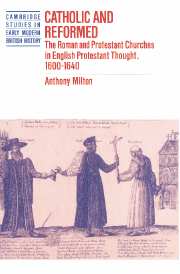Book contents
- Frontmatter
- Contents
- Acknowledgements
- List of abbreviations
- Prologue
- Introduction: English Protestantism at the dawn of the seventeenth century
- Part I The Church of Rome
- Part II The Reformed Churches
- 8 Doctrinal links: a harmony of confessions?
- 9 ‘The best Reformed Church’: church government and politics
- Conclusion
- Select bibliography
- Index
- Cambridge Studies in Early Modern British History
9 - ‘The best Reformed Church’: church government and politics
Published online by Cambridge University Press: 31 October 2009
- Frontmatter
- Contents
- Acknowledgements
- List of abbreviations
- Prologue
- Introduction: English Protestantism at the dawn of the seventeenth century
- Part I The Church of Rome
- Part II The Reformed Churches
- 8 Doctrinal links: a harmony of confessions?
- 9 ‘The best Reformed Church’: church government and politics
- Conclusion
- Select bibliography
- Index
- Cambridge Studies in Early Modern British History
Summary
The problem of Reformed church government
Joseph Hall acted as the mouthpiece of English Calvinists when he explained that issues of discipline were of minor importance for relations between the different Reformed Churches. The varying forms of Protestant church government were, he explained, ‘not … essential to the being of a church, though much importing the well or better being of it, according to our several apprehensions thereof’, and the different Protestant Churches therefore retained ‘a reverent and loving opinion of each other’. While this explanation may have seemed straightforward, it was still problematic in its treatment of an area where Protestants were openly at variance. Most Reformed Churches considered themselves to be ‘the best reformed church’, and even if few considered their form of church government to be vital to the esse (being) of a church, their conviction that it might well ‘import the well or better being of it’ naturally tended to undermine any suggestion that all forms of church government and ceremony were essentially things indifferent, to be varied at will in each individual church. Even Joseph Hall himself did not always sustain the relativistic tone adopted above.In a different context, Hall could be found urgingthe Church of England's own form of episcopal church government as ‘universaland unalterable’ and ‘appointed by the Holy Ghost’, and maintaining that ‘to depart from the judgment and practice of the universal church of Christ ever since the apostles’ times, and to betake ourselves to a new invention,cannot but be, besides the danger, vehemently scandalous'.
- Type
- Chapter
- Information
- Catholic and ReformedThe Roman and Protestant Churches in English Protestant Thought, 1600–1640, pp. 448 - 528Publisher: Cambridge University PressPrint publication year: 1995



